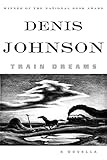 When I think back on this year, two particular books come to mind. The first I read in the spring, Hervé Le Tellier’s Enough About Love. It’s a self-consciously French novel, I suppose, in that it is explicitly self-conscious and in that it deals with affairs of the heart involving, among others, two Parisian psychoanalysts and a writer who bears a resemblance to Le Tellier. I admire books that can convincingly describe the twists and turns of romance. Le Tellier does so with deceptive ease. He tells the story from multiple perspectives — male and female — and moves the action along with intelligence and wit. He also plays something of a formal game with the novel’s structure, a game that he reveals near the end of the novel. But even if you don’t care particularly about the sort of narrative game Le Tellier plays, you can still be taken in by the novel and wonder how Le Tellier will bring everything to its conclusion — which he does in a satisfying and unsentimental way.
When I think back on this year, two particular books come to mind. The first I read in the spring, Hervé Le Tellier’s Enough About Love. It’s a self-consciously French novel, I suppose, in that it is explicitly self-conscious and in that it deals with affairs of the heart involving, among others, two Parisian psychoanalysts and a writer who bears a resemblance to Le Tellier. I admire books that can convincingly describe the twists and turns of romance. Le Tellier does so with deceptive ease. He tells the story from multiple perspectives — male and female — and moves the action along with intelligence and wit. He also plays something of a formal game with the novel’s structure, a game that he reveals near the end of the novel. But even if you don’t care particularly about the sort of narrative game Le Tellier plays, you can still be taken in by the novel and wonder how Le Tellier will bring everything to its conclusion — which he does in a satisfying and unsentimental way.
 The other book, Denis Johnson’s novella Train Dreams, I read on the train from Boston to New York. It was just long enough for the ride. Well, it was a little shorter than the ride, but I reread some passages more than once. You don’t need to read the book on a train, but it certainly doesn’t hurt. Johnson is one of my favorite living American writers. I’ve reread his collection Jesus’ Son: Stories countless times and still occasionally think about certain creepy scenes from his fist novel, Angels. In Train Dreams, Johnson manages again to construct a world that feels like it’s part dream, part reality. Reading the book, Johnson convinces you that this is the actual state of the world, and that your belief in or insistence upon the world as a rational place is illusory. I suppose I should mention that the book takes place in the first half of the 20th century and is set, to a great extent, in the lumber camps of the Pacific Northwest. Johnson’s grip on the details and the terminology of lumbering is impressive. So too is the vividness and earthiness of his language. And also its concise and epigrammatic quality. “It was only when you left it alone that a tree might treat you as a friend. After the blade bit in, you had yourself a war.” The novella is 116 pages, but it is as rich, moving, and ambitious as any novel I read this year — and, because it is so compact, more powerful for it.
The other book, Denis Johnson’s novella Train Dreams, I read on the train from Boston to New York. It was just long enough for the ride. Well, it was a little shorter than the ride, but I reread some passages more than once. You don’t need to read the book on a train, but it certainly doesn’t hurt. Johnson is one of my favorite living American writers. I’ve reread his collection Jesus’ Son: Stories countless times and still occasionally think about certain creepy scenes from his fist novel, Angels. In Train Dreams, Johnson manages again to construct a world that feels like it’s part dream, part reality. Reading the book, Johnson convinces you that this is the actual state of the world, and that your belief in or insistence upon the world as a rational place is illusory. I suppose I should mention that the book takes place in the first half of the 20th century and is set, to a great extent, in the lumber camps of the Pacific Northwest. Johnson’s grip on the details and the terminology of lumbering is impressive. So too is the vividness and earthiness of his language. And also its concise and epigrammatic quality. “It was only when you left it alone that a tree might treat you as a friend. After the blade bit in, you had yourself a war.” The novella is 116 pages, but it is as rich, moving, and ambitious as any novel I read this year — and, because it is so compact, more powerful for it.
More from A Year in Reading 2011
Don’t miss: A Year in Reading 2010, 2009, 2008, 2007, 2006, 2005
The good stuff: The Millions’ Notable articles
The motherlode: The Millions’ Books and Reviews
Like what you see? Learn about 5 insanely easy ways to Support The Millions, The Millions on Twitter, Facebook, Tumblr.









